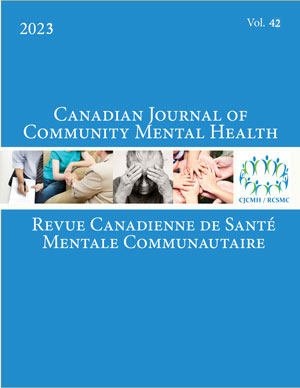Volume 29 • Number 2 • September 2010
OPEN ACCESS
OPEN ACCESS
OPEN ACCESS
OPEN ACCESS
OPEN ACCESS
OPEN ACCESS
Cette étude propose une analyse de contenu approfondie de 345 demandes d'aide acheminées par des jeunes de 9 à 17 ans à un service d'aide anonyme, faisant état de différentes manifestations de violence psychologique parentale. Elle dresse un portrait global de l'univers de la violence psychologique telle que rapportée par des jeunes qui en sont victimes, selon 5 grands thèmes: (a) l'expérience de victimisation, (b) le contexte familial, (c) le niveau de détresse et les réactions émotives, cognitives et comportementales des jeunes, (d) les mécanismes d'adaptation et de soutien et (e) les conséquences perçues de la violence psychologique.
OPEN ACCESS
This paper reports the findings from an online survey that explored the perceptions of 111 leaders within community mental health organizations in Ontario about how responsive they are to the service needs of people from diverse cultural-linguistic groups. The findings show that more than half of respondents said they engaged in 20 of the 27 practices that promote cultural responsiveness. Comparisons of community organizations with different service philosophies found only one difference in terms of engaging in culturally responsive practices. Specifically, the difference was in whether or not staff received ongoing training in how to work with people from the cultural-linguistic groups the organization serves. These data provide a baseline against which progress can be measured toward greater cultural responsiveness in community mental health organizations in Ontario.
OPEN ACCESS
In light of current reforms designed to enhance primary care and service integration, this study assesses variables associated with referrals of general practitioners (N = 398) to and their contacts with mental health care providers. Referrals appeared to be more closely related to the case complexity of patients and GPs' individual characteristics (i.e., perceived importance of interorganizational relationships, experience and expertise in mental health), whereas contacts were linked more closely to issues of system quality and access to a shared-care model. Our findings (a) support the development of collaborative models to enhance relationships between mental health care providers and GPs, and (b) promote greater availability and diversity of mental health care services.
OPEN ACCESS
Consistent with contemporary theories related to the well-being and adjustment of children, the Ontario Child Welfare Transformation policy suggests that researchers and practitioners consider multiple levels of analysis when attempting to understand, prevent, and respond to childhood adversity. By examining the phenomenon of parental stress among child welfare cases, the present study sought to integrate family, child, and service-system levels of analysis through a family-based standpoint of investigation. A sample of 135 families was selected from three Children's Aid Societies in southern Ontario. Using hierarchical regression, we found that child developmental milestones (4–47 months old) and child behavioural and emotional strengths (48 months +) were associated with parental stress, accounting for variance beyond family-level predictors. Children of parents who were stressed had higher health and social service costs, though this trend did not apply for stressed parents themselves. Theoretical and applied implications are discussed.










